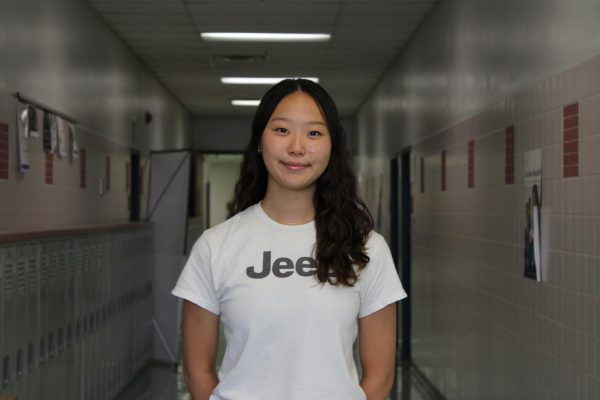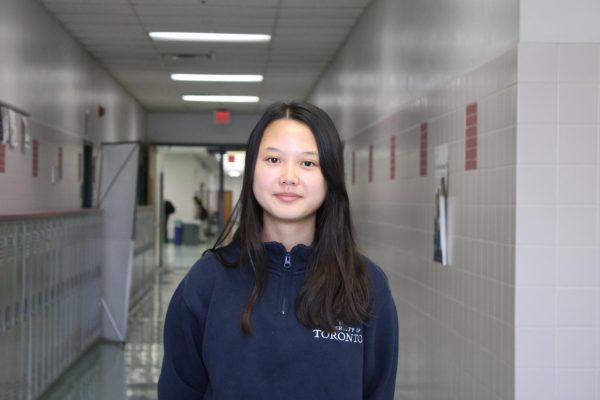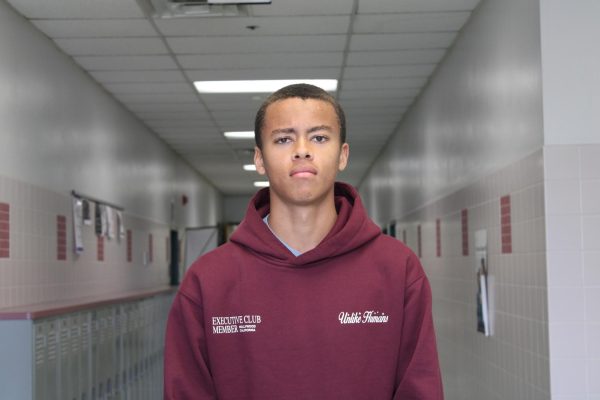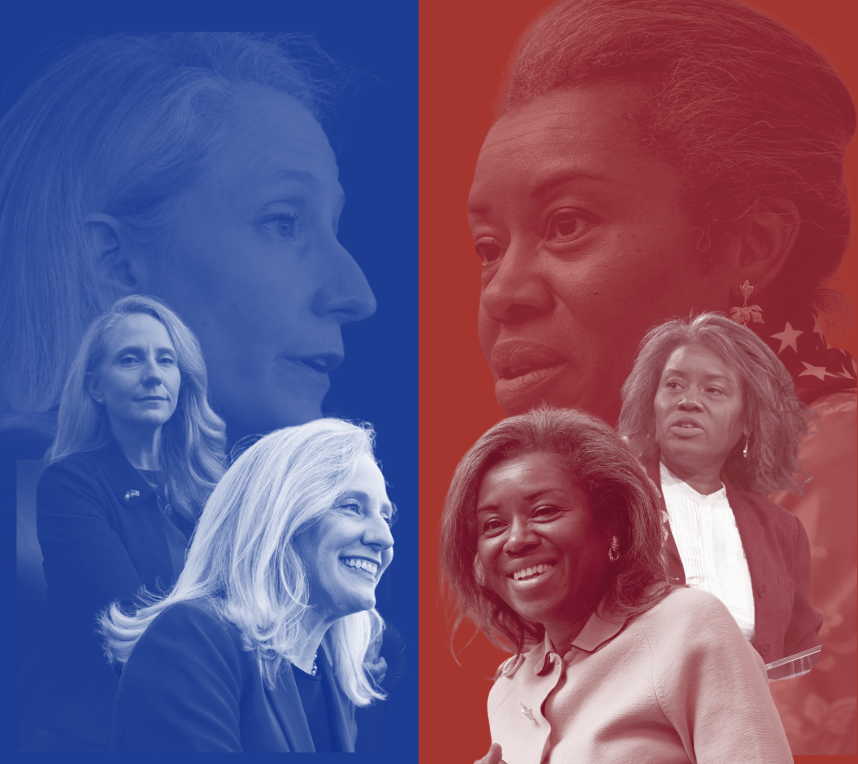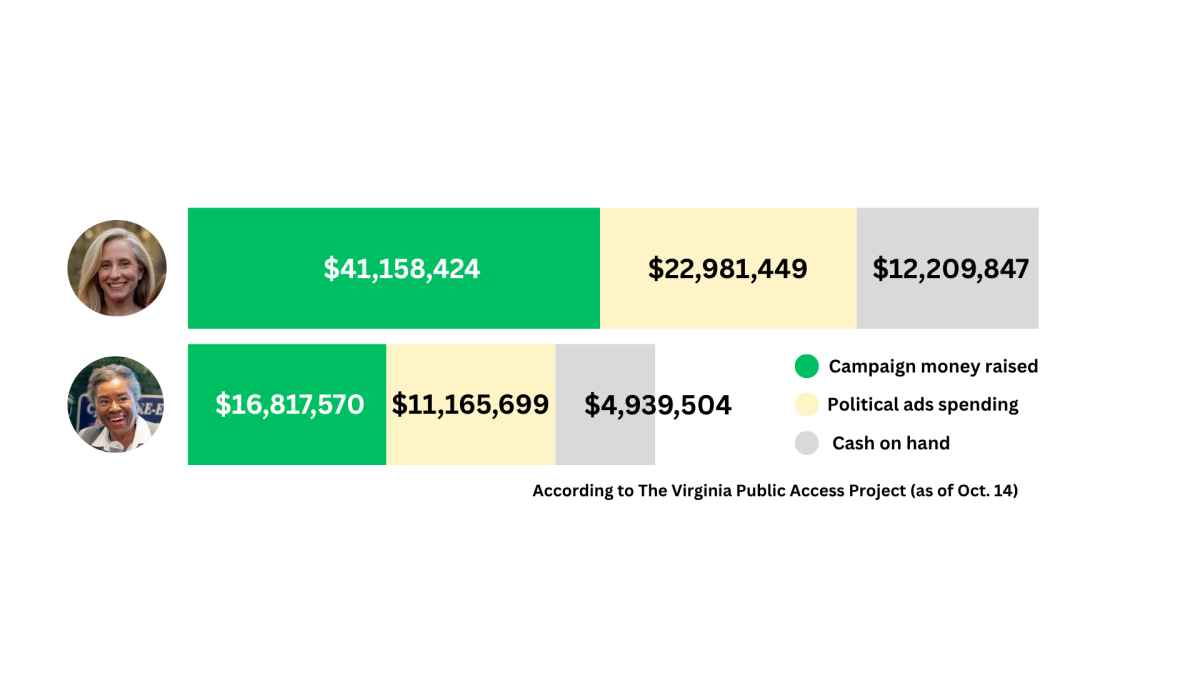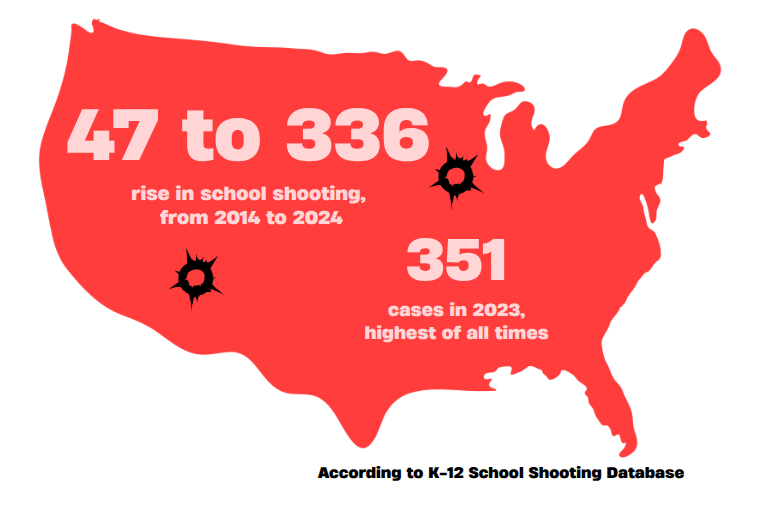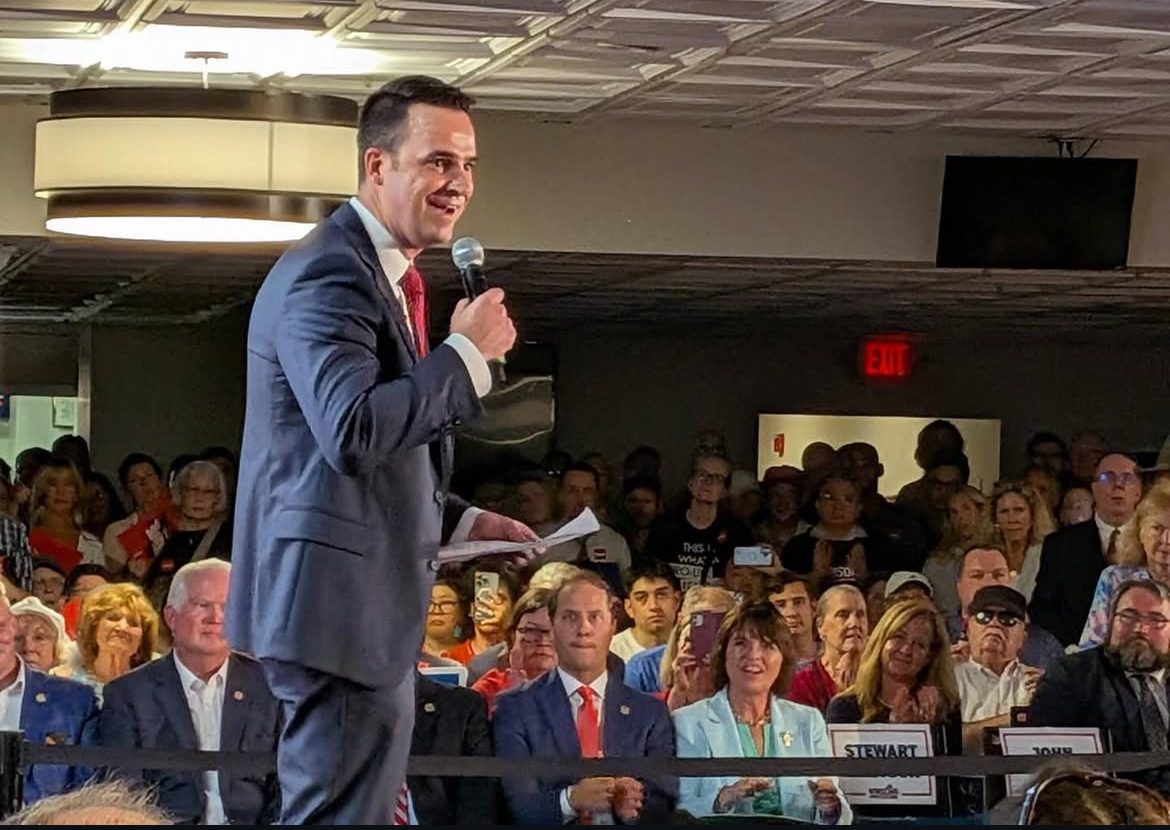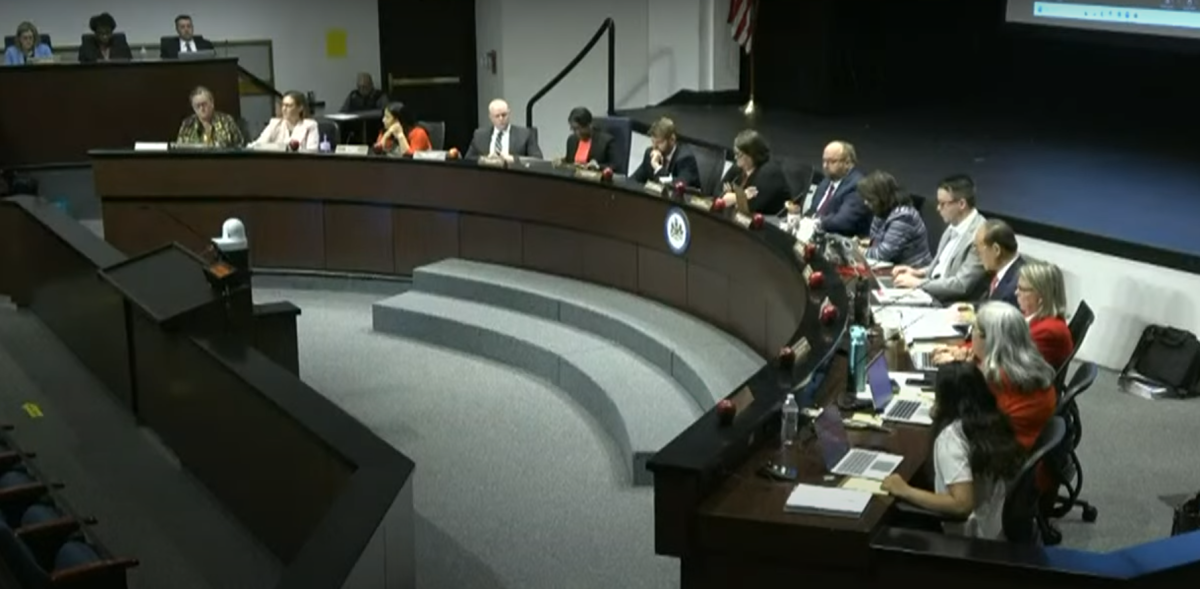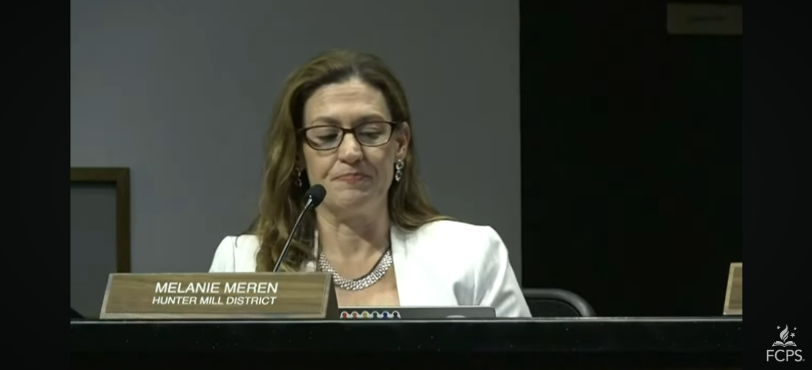Virginia welcomes Madame Governor
Lights flash as two candidates, both women, step on a brightly lit stage on Oct. 9 at Norfolk State University. The moderators adjust their papers and introduce the two candidates on a microphone. The contenders debate for a position as governor and a historic position as the first female governor of Virginia.
With Youngkin not eligible for re-election under Virginia state law, the race has two candidates who attempt to tackle Virginia’s future. Both candidates have focused their campaigns on topics including affordability, education and public welfare while encompassing their own political agendas. Both candidates also face the looming threat of Virginia voting history, a pending government shutdown, and ever-raising costs of living. As Election Day nears on Nov. 4, Virginia voters will head to the polls to decide which candidate will reflect their state’s next chapter.
Abigail Spanberger
On Nov. 13, 2023, former CIA officer and representative of Virginia’s 7th Congressional District Abigail Spanberger announced her campaign for Virginia’s governor. Throughout her campaign, she emphasized targeted investments to lower healthcare, energy and housing costs as part of her Affordable Virginia Plan. Moreover, in regard to workforce development, Spanberger also pushes the Growing Virginia Plan, an economic plan that focuses on expanding Virginia’s workforce, increasing business investments and trade opportunities. Specifically, it increases apprenticeship and internship programs that support more technical education, improving affordable childcare and housing, while also focusing on small business growth.
“I feel like Spanberger is a stronger candidate,” senior Aarna Bhamidipati said. “She has a lot more government experience that is more robust and also has a good bipartisan record which I think we need now more than ever.”
As both a parent and former student of Virginia’s public schools, Spanberger considers education in the state a focal concern of her campaign. Her Strengthening Virginia Schools Plan supports improvements in reducing teacher shortages, modernizing school infrastructure and making more adaptations to 21st-century careers. Additionally, Spanberger aims to overturn several policies from Youngkin, including Executive Order 47, a policy that requires state and local law enforcement to work with federal immigration authorities.
Recently, in her campaign and the Virginia gubernatorial debate, Spanberger faced scrutiny for not requesting Democratic Attorney General candidate Jay Jones to step down. This occurred following the revelation of private messages of Jones using violent language in reference to former Virginia House Speaker Todd Gilbert. Additionally, a lack of position on a transgender sex offender’s indecent exposure to minors has prompted several others to criticize her on this issue.
“Spanberger really dodged the questions that Sears had for her,” senior Jackson Fuller said. “[Sears] just had good points and Spanberger didn’t have anything really for those points.”
Winsome Earle-Sears
Opposing Spanberger is Earle-Sears, the current 42nd lieutenant governor of Virginia and Republican nominee for the 2025 gubernatorial election, who announced her campaign on Sept. 5, 2024. She served in the Virginia House of Delegates from 2002 to 2004 and is a U.S. Marine Corps veteran.
As lieutenant governor, Earle-Sears has presided over the Virginia Senate for nearly four years, casting tie-breaking votes, including voting to oppose the Right to Contraception Act, a proposal that introduced measures to secure the right to contraception in Virginia earlier this year. She follows Youngkin’s policies requiring transgender students to use bathrooms and locker rooms that align with their sex assigned at birth. According to her website, Earle-Sears aims to lower taxes, eliminate the car tax, cut government spending, push for school choice, improve public safety and protect the right to work.
“A lot of people at this point don’t like Youngkin anymore, at least for us in NoVa,” Fuller said. “Because Sears hasn’t really put anything forward during her time as lieutenant governor, I would say it gives her no advantage.”
At the same time, Earle-Sears has faced criticism for invoking slavery to attack DEI programs and opposing same-sex marriages. Additionally, questions have been raised about how Earle-Sears has declined to fully respond to the Freedom of Information Act on her financial activities as lieutenant governor, raising concerns about her transparency to voters.
“The shift in her campaign away from focusing on the economy, which is the primary driver of voter interest right now to instead, the social cultural issues suggest that she’s concerned about motivating the Republican base at this late stage of the campaign,” Rozell said. “At this stage, the Republican nominee should not be so focused on ratcheting up the base.”
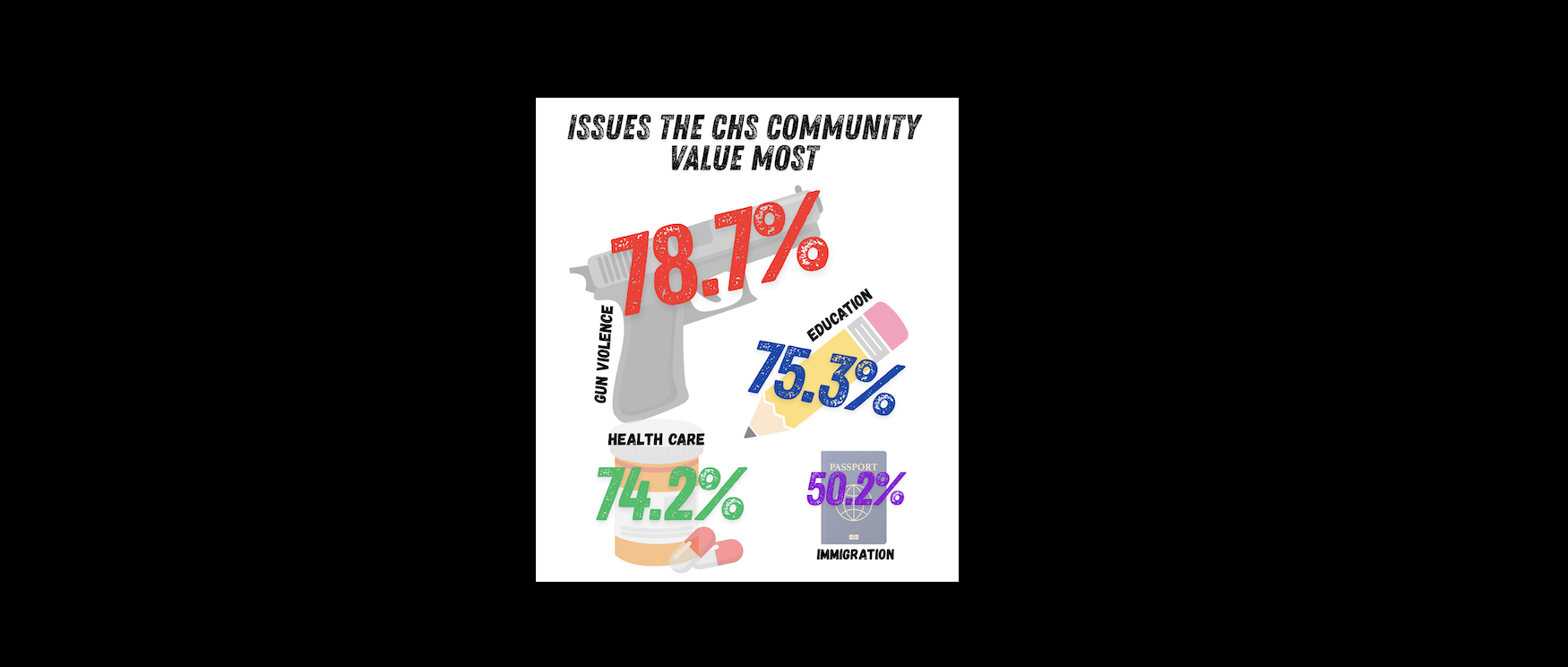
As many high school seniors turn 18 and become eligible to participate in this year’s gubernatorial election, students such as senior Yasmin Englin feel empowered to vote.
“I think that voting is kind of the same principle as buying from a corporation to support their cause, except it gives you a direct way to really show your voice,” Englin said. “I definitely try to keep up to date with who is running our government, what’s going on [and] the kind of issues people are talking about.”
Based on a survey of 101 people conducted among the CHS community through a Google Form in Sept, comprising both students and staff, 72.6% would vote for Democratic candidate Abigail Spanberger, indicating a large leftward bias.
“I kind of look for someone that’s gonna, like, work with both sides, because for anything to really get done, you want cooperation between both sides,” senior Jackson Fuller said. “ I think Sears and Spanberger are moderate right and moderate left [respectively], they’re not in the middle, but they’re certainly not extremists.”
By enrolling in courses such as Political Science or AP Government, seniors develop a stronger grasp of how elections function and the systems that shape them. These classes also help students stay updated on the upcoming governor’s race and the issues influencing it.
“As a senior, I take both Political Science and AP Comparative Government, and I’d always been interested in politics, but it has definitely changed the way I view local, specifically Virginia, elections,” senior Aarna Bhamidipati said.
From gun violence to immigration, respondents could choose more than one issue they cared about when voting. According to the survey, issues CHS cares most about are gun violence, healthcare and education.
“As a student, I’m going to focus more on [education] and maybe talk about [education] more with my friends, whether it’s phone policies or restrictions,” Bhamidipati said. “Especially here in Northern Virginia, we’re known for a good education system, so I think it’s important the policies that they’re trying to play out and put into place.”
Although total spending so far is substantially lower in this Virginia election than the previous one, the gap between the two candidates’ spending is wide. In political ads for example, Spanberger’s $17.1 million spent far outpaces Earle-Sears’ $5.6 million.
“A lot of their spending now is done by what were called non-connected PACs, or non-connected committees,” social studies teacher Clement said. “Then you have ads that are produced by groups that aren’t technically connected to the campaign, but they clearly are in favor of one candidate or another.”
Whilst campaign expenditure and electoral success have a positive correlation, according to a study by Sage Journals, higher spending doesn’t always translate to election wins. In the 2021 gubernatorial race for example, Democrat Terry McAuliffe outspent Republican Glenn Youngkin’s campaign by a margin of $1.1 million, yet Youngkin won the election. Other factors such as party affiliation, gender and incumbency also play a role in election outcomes.
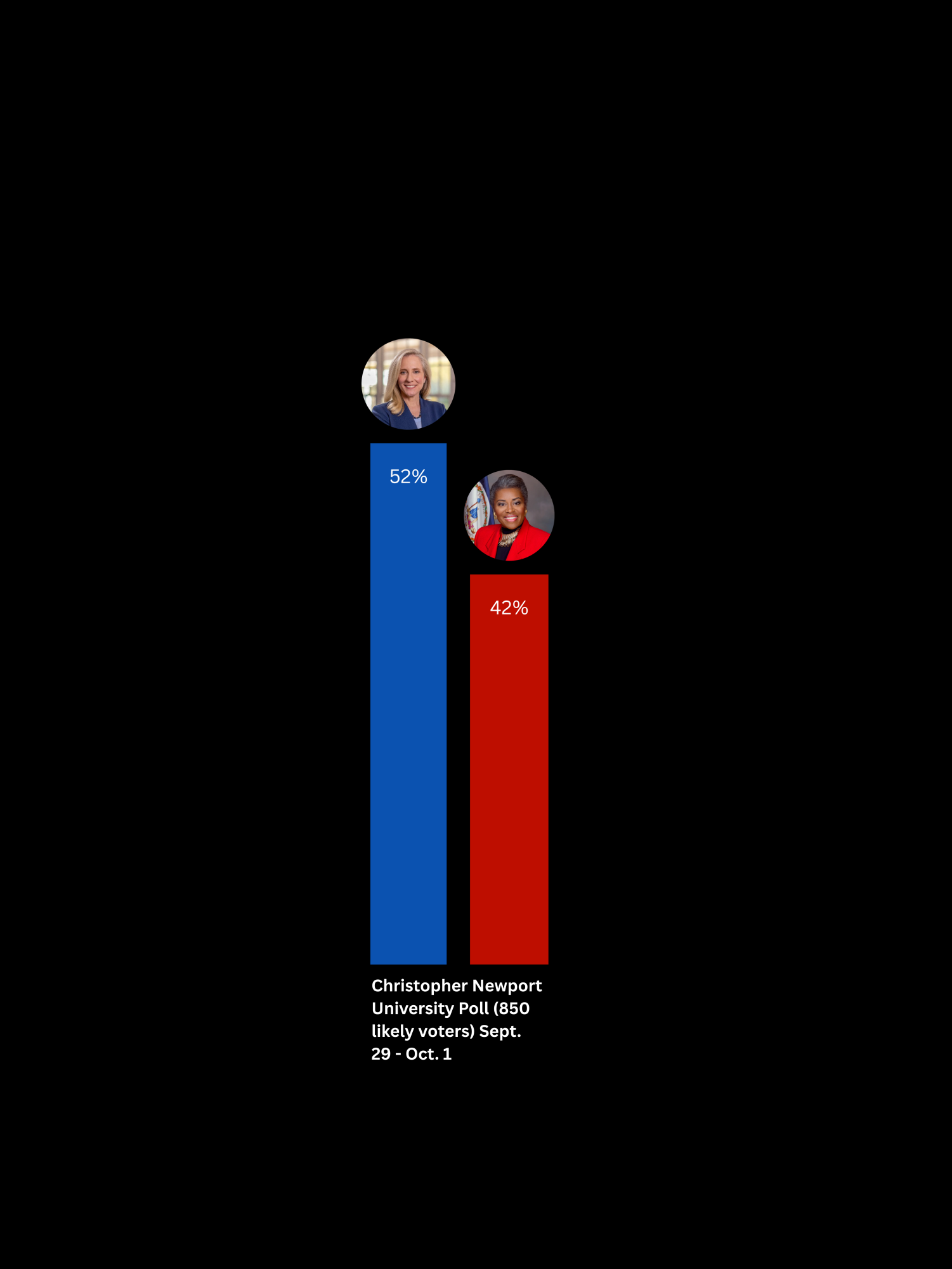
Winsome Earle-Sears won’t just be competing against her Democratic counterpart, Abigail Spanberger, when voters hit the polls on Nov. 4. The Republican candidate will also be staring down one of the most consistent electoral patterns in U.S. state politics.
“Perhaps the biggest worry Republicans have,” Dean of George Mason University’s Schar School of Policy and Government Mark Rozell said. “[Is that] historically, [in] the past half century, the party in the White House, with one exception, has always lost the Virginia governor’s race the next year.”
This trend was created by the unusual circumstances of Virginia’s gubernatorial election, which falls on an off year—a year in which there is neither a presidential election or a midterm election. Virginia’s status as a purple state has also influenced this tendency.
“Virginia and New Jersey [are] the only two states that elect a governor after the year [of] the presidential election,” Clement said. “Virginia gets a lot of national attention because it’s usually seen as a referendum on how the president’s first year has gone.”
Virginia’s trend also disregards the sitting president’s margin of victory in Virginia the previous year. Since 1977, Republicans carried Virginia in five of their presidential elections, with an average margin of 16.5 points—yet none of those presidents saw a Republican governor of Virginia elected during their term.
One possible explanation for this trend is the partisan mobilization hypothesis. According to the Center for Politics, “off year elections produce a shift in turnout in favor of the party that does not control the White House.” Turnout drops overall for off-year elections: in 2021, Virginia’s 54.9% turnout (a 15% increase on the previous year) was about 20% lower than the state’s presidential election turnout. However, in these off-year elections, turnout of voters aligned with the party not in control of the White House is historically higher.
There was an error loading the selected infographic
Only one governor has defied this historical trend. Democrat Terry McAuliffe broke the 36-year-old streak with a win in 2013 under Democratic President Barack Obama—coincidentally enough, the U.S. government experienced a shutdown a month before Election Day that was widely attributed to Republicans.
McAuliffe also far out-spent his opposing candidate. Higher spending has historically led to higher success rates in elections, and thus far Spanberger has dominated in campaign spending and money raised. Earle-Sears’ lower amounts could make it harder for her to defy the Virginia rule.
Your donation will support the student journalists of Chantilly High School. Your contribution will allow us to cover our printing and annual website hosting costs.
